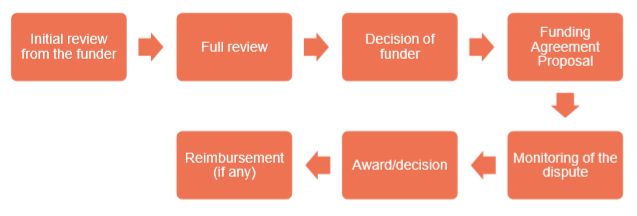- within Insurance topic(s)
- with readers working within the Insurance industries
Introduction
Considering the current state of international business, cross-border disputes are at the order of the day. And the truth is the complex nature of some international dispute proceedings such as international arbitration can be expensive. Parties may therefore face the hard choice of renouncing to bring valid claims due to the prohibitive costs of litigating them. The significant use and availability of third-party funding (TPF) has facilitated a solution to this conundrum.
The purpose of this Blog post is to provide you with an overview on third-party funding in Switzerland as well as practical tips when applying for third-party funding.
What's the role of TPF?
Third-party funding is a financing arrangement by which a third party entity with no legal status in a dispute funds some or all of a party's legal costs. In return, the funder will receive a set portion of the amount recovered (usually between 20% and 30%) or a multiple on the funder's investment (whichever is higher).
What makes third-party funding attractive is the fact that in the event the claim is unsuccessful, the funder will not be paid. Repayment to the funder is therefore contingent on the party's success in the dispute.
While such mechanism has been initially catered for money-strapped litigants with a valid claim, it is now increasingly used by perfectly solvent claimants as a tool to manage financial risks and protecting capital. For some, TPF not only improves access to justice but also acts as a filter for unmeritorious claims.
How is TPF regulated in Switzerland?
There is no Swiss legislation regarding third-party funding in litigation or arbitration. Nor are there any specific provision in the different existing acts such as the Swiss Code of Civil Procedure and Chapter 12 of the Swiss Private International Law Act that governs international arbitration.
According to a landmark decision in 2004 from the Swiss Federal Tribunal,1 third-party funding is permissible under Swiss law and is, in principle, protected by the fundamental right of economic freedom provided that the lawyer representing the party seeking funding may act independently from any instruction of the third-party funder. This was confirmed in 2014, the Swiss Federal Tribunal stating that depending on the concrete circumstances, there is even a duty for the lawyer to inform the client about litigation funding options as well as representing the client in the conclusion of the funding agreement.2
Other jurisdictions, such as Hong Kong and Singapore, have already introduced legislation expressly allowing for third-party funding in international arbitration. The Hong Kong government has even published in December 2018 a "Code of Practice for Third Party Funding of Arbitration" according to which third party funders are expected to comply when carrying out third-party funding of arbitration activities in Hong Kong.3
How does a funding process look like?
Before seeking for funding it is useful to understand a typical funding process, in order to manage a party's expectations. Third-party funders are in the dispute business to make a profit, and in order to mitigate the risk involved in such business, funders go through what is commonly referred to as a funding process. This typically involves a thorough and independent assessment of the claim in order to evaluate the success probabilities of a claim. In principle, a funding process will usually observe the following steps:

The time-frame for the initial review and the full review is really circumstantial to the specifics of the case. For example, some complex cases may require a funder, either internally or through the services of external lawyers or experts, to undergo a full diligence that can last up to 6 to 9 months. It is therefore essential for parties seeking funding to count with the support of legal counsel in order to address all aspects of the dispute under review by the funder.
How to maximise the chances of securing funding?
Parties may consider the following tips in order to secure the increasingly available pot of money ready to fund arbitration disputes:
1.1. Consider time and resources
The funding process pictured above may seem straightforward but can require more time and re-sources than initially expected. A party must understand that the funding process itself may entail considerable legal costs.
2. Retain an experienced legal team
In particular for arbitration, the lack of expertise may cause proceedings to last longer and cost more. Third-party funders will want to know whether the legal team has the required experience and capacity to deal with the type of claim.
3. Present the case transparently
The review undertaken by the third-party funder will normally entail the party and/or its counsel, to present a funding memorandum. It is important that such memorandum addresses all points of the dispute in a clear, transparent, and structured manner, with the most relevant documents annexed.
Third-party funders usually have a dedicated team of lawyers with experience in litigation and inter-national arbitration who will easily spot the weak points of a claim. Those weak points must there-fore be addressed and fully disclosed from the very outset in the funding memorandum.
4. Prepare a detailed budget
Third-party funders will normally require a detailed budget for all the costs associated with the litigation/arbitration process. This includes the legal fees for each step of the procedure (submissions, document production, hearing, etc.), as well as the costs of the arbitral tribunal, the administrative costs (if any), and other expenses such as court reporters, experts and hearing costs (venue, accommodation), among others.
5. Prepare an enforcement strategy
Third-party funders will scrutinise the prospects of recovery in case of a favourable outcome. Making sure that an enforcement strategy has been carefully prepared and that recovery is feasible is key to obtain funding.
In that line, it is important to analyse whether third-party funding is accepted or not in the jurisdiction of enforcement. It does so happen that in some jurisdictions the concept of thirdparty funding is largely unknown or untested, causing difficulties for the enforcement of an award.
6. Understand the involvement of the third-party funder
Engagement throughout the proceedings varies from one funder to another. Some will only take a somewhat distant role while others will participate in every step, including, for example, the selection of arbitrators, the finalisation of submissions, the strategy of the case and even push for settlement.
The party must understand from the very outset that the third-party funder will play a decisive role in how the dispute is managed, considering it is funding the costs and has an interest in making sure that there is a positive outcome. In that line, it is important to remember that according to the Swiss Federal Tribunal, a funded party's legal counsel must be able to act independently from any instruction of the third-party funder.
7. Manage conflicts of interests
Third-party funders must be clear of conflicts with any of the parties, members of the arbitral tribunal and legal counsel, not only at the outset of the arbitration proceedings, but also throughout its duration.
8. Ensure capital adequacy
Parties trust that the funder has the required money to finance the dispute. Third-party funders must ensure a capital adequacy. Along these lines, the Hong Kong "Code of Practice for Third Party Funding of Arbitration" stipulates that a third-party funders must "maintain access to a minimum of HK$20 million of capital" (the equivalent of CHF 2.5 million / EUR 2.2 million).
Conclusion
Let's not forget: while the paradigm of access to justice has often been hailed to justify the emergence and consolidation of third-party funding, third-party funders seek to make a profit from their investments. The funding process will therefore usually require considerable efforts and costs from a party and its legal counsel in order to secure financing. In fact, a party may find itself benefitting from such process by presenting a more solid case and ultimately having a better chance in pursuing its claims.
Footnotes
1 Swiss Federal Tribunal Decision ATF 131 I 223.
2 Swiss Federal Tribunal Decision 2C_814/2014.
3 Available at https://www.info.gov.hk/gia/general/201812/07/P2018120700601.htm
The content of this article is intended to provide a general guide to the subject matter. Specialist advice should be sought about your specific circumstances.
[View Source]


